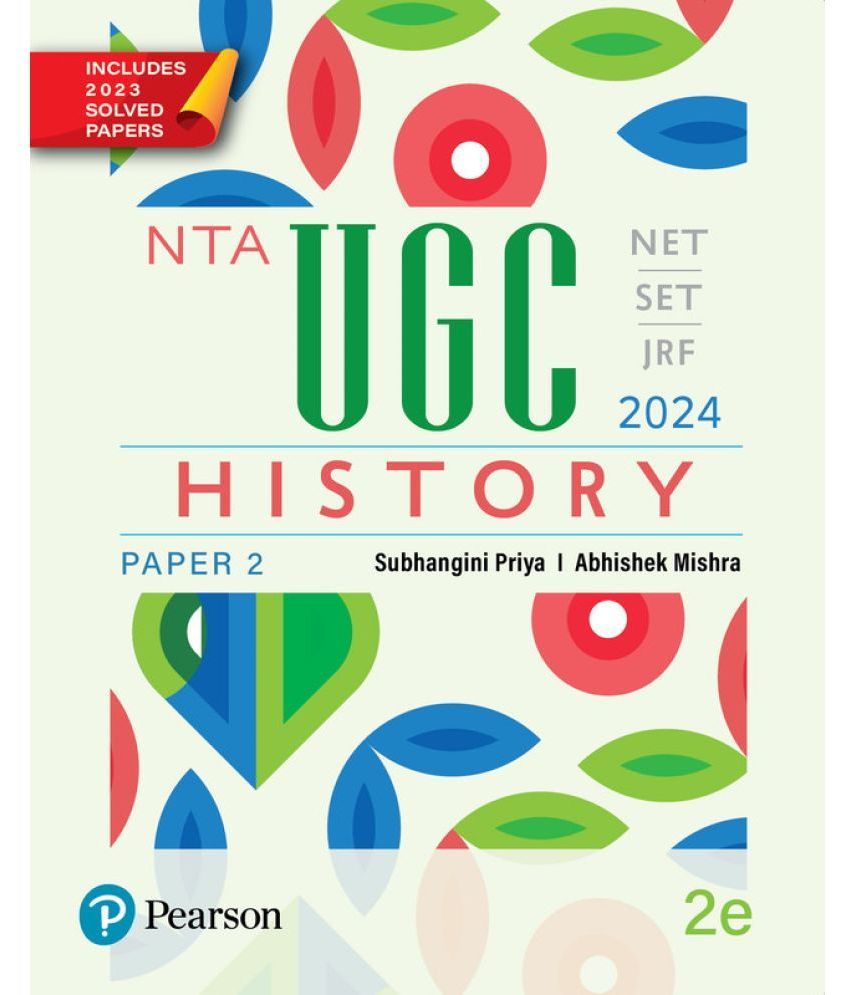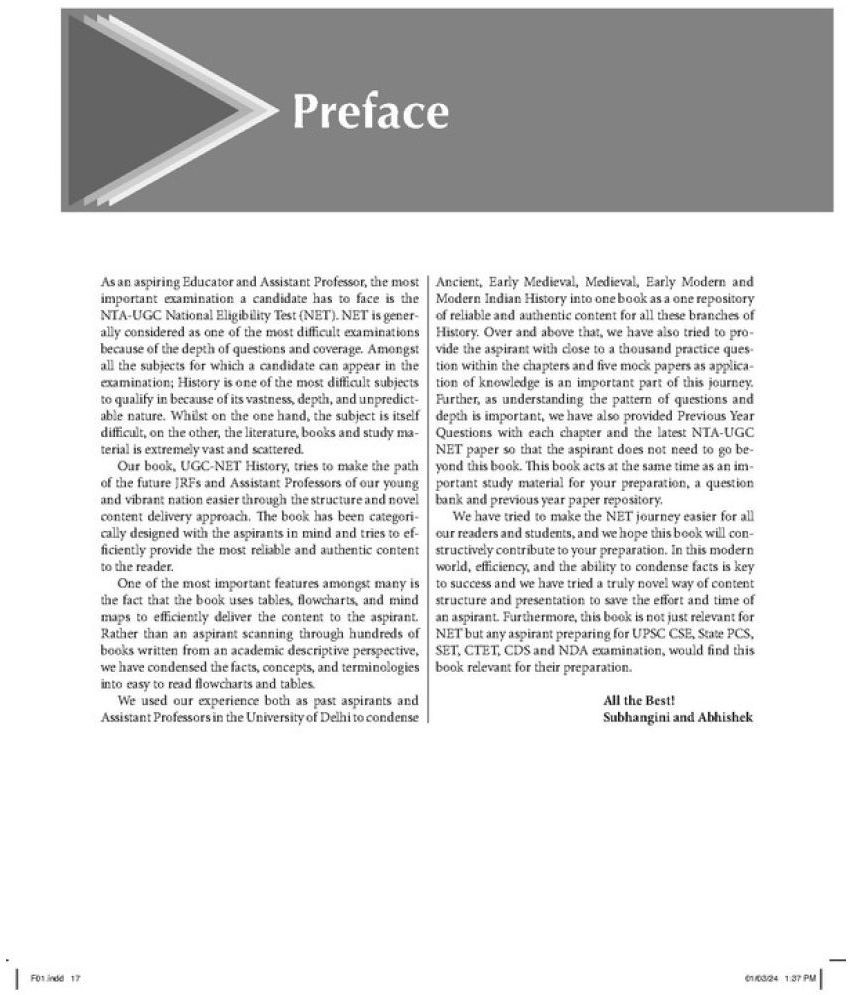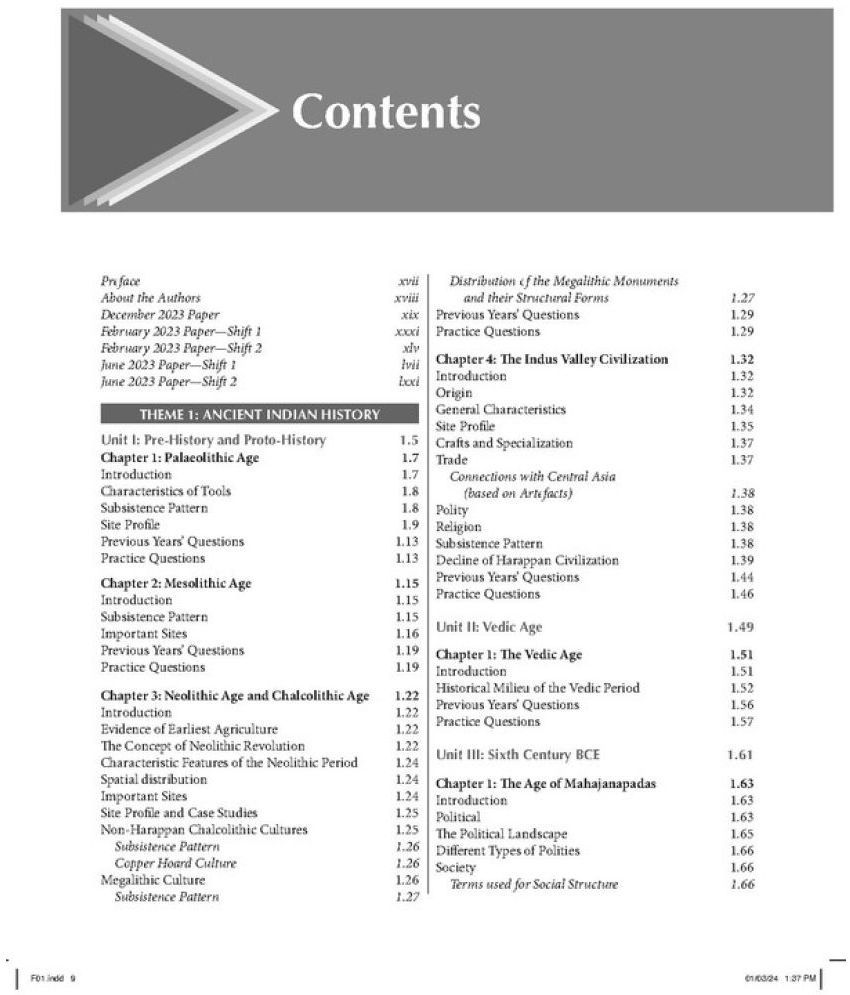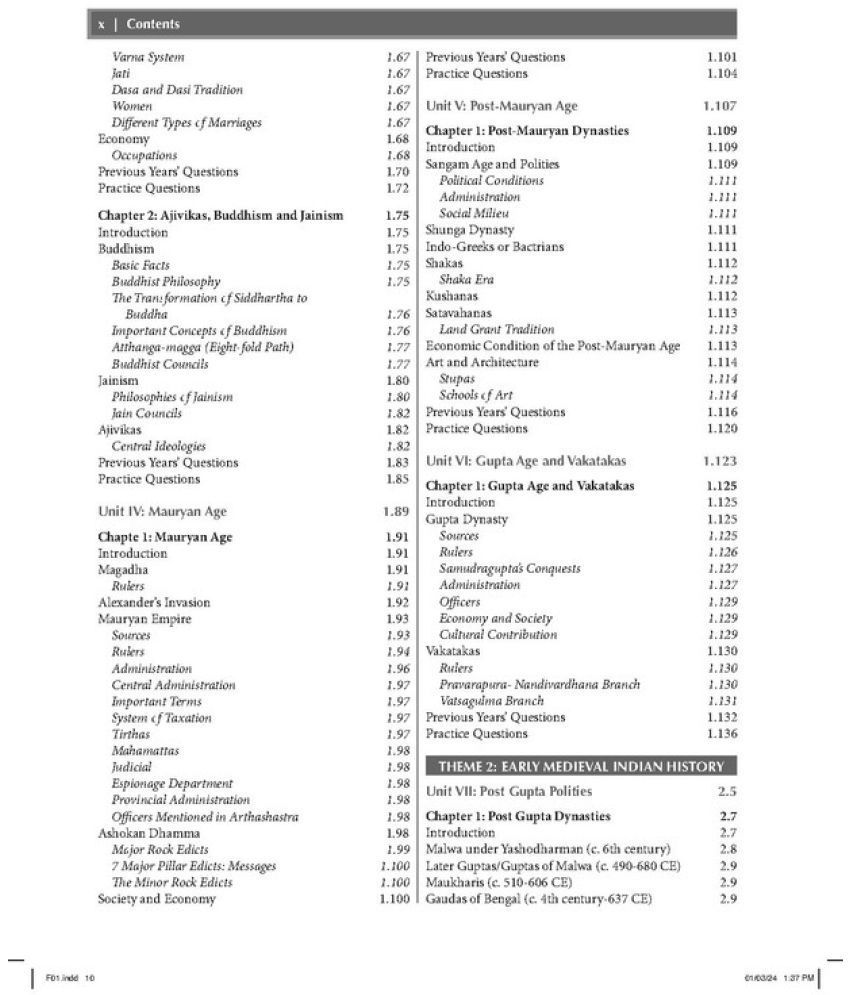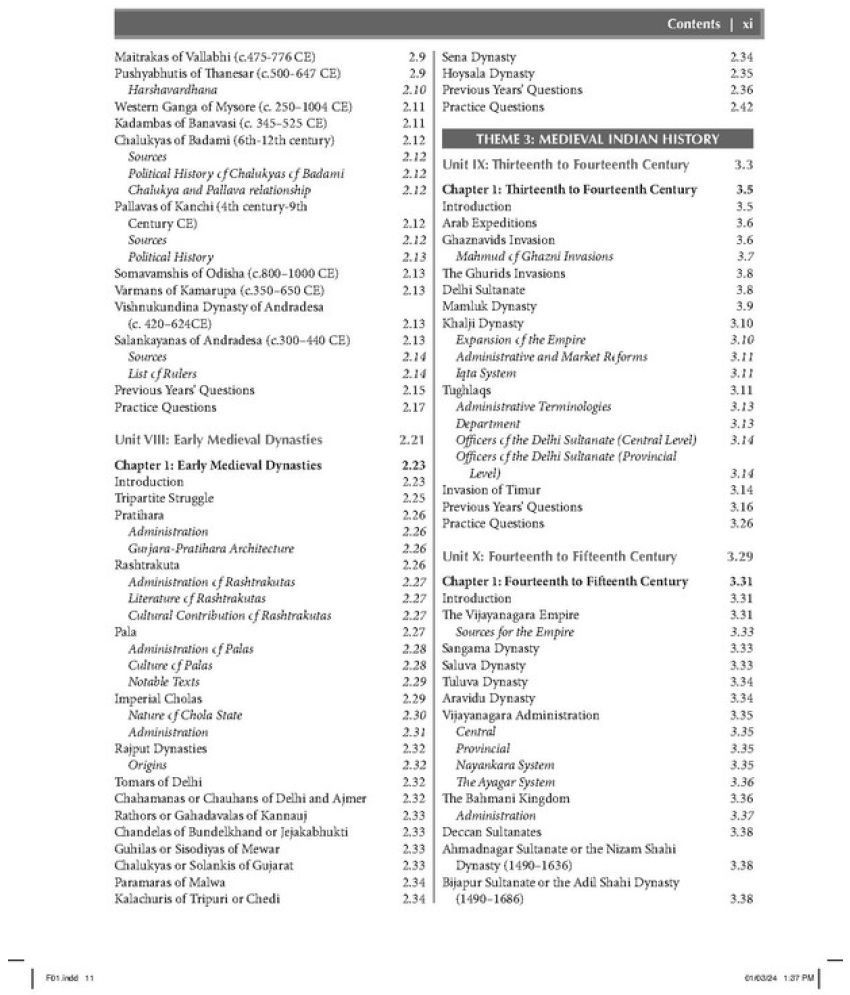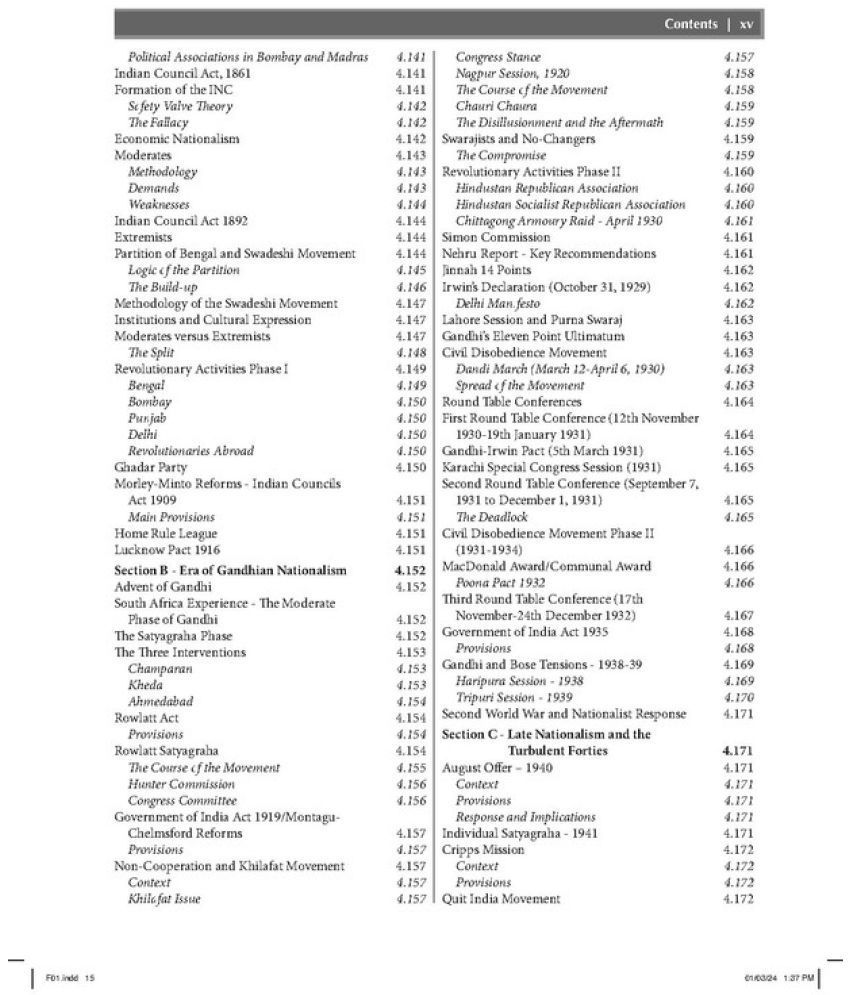Amongst all the subjects an aspirant can appear for in the NTA-UGC NET examination, History is one of the most interesting, fascinating, and relevant subject to study for this prestigious exam. The history of the Indian civilization is a tapestry of politico-economic, societal, technological, and cultural milestones, and this book, in its second edition, is a snapshot of this vibrant and diverse story of continuity and change into four broader Themes - Ancient, Early Medieval, Medieval and Modern History.
India and its history truly encompasses the history of civilizations, empires, conquest, valor, wars, struggle, innovation, cultural amalgamation, tolerance, and unity in diversity. This book at the same time pays homage to this vibrant and fascinating history and prepares the reader for the one of the toughest examinations in our country.
Using a novel pedagogical approach which embodies in itself; efficiency and ease of learning; this book uses tables, flowcharts, figures, and illustrations to engage the reader in the learning process
Features –
1. Updated with December 2023 Solved paper
2. Chronological Timelines for Ancient, Early Medieval, Medieval and Modern History
3. Previous Year Questions from 2012-2022 divided as per each and thematic.
4. 1000+ Practice Questions to judge students’ understanding of the subject
5. 5 Mock Tests to simulate examination experience
6. Maps of every era sketched for readers’ knowledge and understanding
About the Author
S. Priya is an Educator who has taught in the University of Delhi as an Assistant Professor for History in multiple colleges. During her years as an Assistant Professor, she has also mentored numerous students in their UGC NET journey. Having cleared NET and JRF multiple times, she is an expert in the fi eld of Indian, European, Chinese, Japanese, and American history. She has completed her post-graduation from the Hindu College, DU and her graduation from Lady Shri Ram College, DU. She is the University Topper in History of her batch and holds multiple Gold Medals for her academic excellence throughout her Postgraduation and Graduation.
Abhishek Mishra is an Educator and Doctoral Research Scholar, who has taught in the University of Delhi as an Assistant Professor for History in multiple colleges. He has also mentored multiple students for UGC NET and UPSC CSE in his years of teaching. He has completed his M.Phil. from the Centre for Advanced Studies, Department of History, University of Delhi and is a specialist of Administrative and Portuguese history in India.
He completed his post-graduation from St. Stephens College, DU and his graduation from Sri Venkateswara College, DU. He is the University Topper in History during his M.Phil., Postgraduation, and Graduation. He has published multiple articles and has represented India in multiple international conferences.
Content –
Theme 1: Ancient Indian History
Unit 1: Pre-History and Proto-History – 1. Palaeolithic Age, 2. Mesolithic Age, 3. Neolithic and Chalcolithic Age, 4. The Indus Valley Civilization,
Unit 2: Vedic Age – 1. Vedic Age
Unit 3: Sixth Century BCE
1. The Age of Mahajanapadas, 2. Ajivikas, Buddhism and Jainism,
Unit IV: Mauryan Age 1. Mauryan Age,
Unit 5: Post Mauryan Age – 1. Post-Mauryan Dynasties
Unit VI: Gupta Age and Vakatakas – 1. Gupta Age and Vakatakas
Theme 2: Early Medieval Indian History
Unit VII: Post Gupta Polities - 1. Post Gupta Dynasties
Unit VIII: Early Medieval Dynasties – 1. Early Medieval Dynasties
Theme 3: Medieval Indian History
Unit IX: Thirteenth to Fourteenth Century
Unit X: Fourteenth to Fifteenth Century 1. Fourteenth to Fifteenth Century
Unit XI: Mughal Dynasty 1. Mughal India
Unit XII: Maratha Dynasty 1. Marathas
Unit XIII: Sikhism 1. Sikhism Theme 4: Modern Indian History
Unit XIV: Early Modern India 1. Early Modern India: Eighteenth Century
Unit XV: Advent of Europeans 1. Advent of Europeans
Unit XVI : Expansion of British Raj 1. Expansion of British Raj
Unit XVII : Consolidation of Raj 1. Consolidation of Raj
Unit XVII : Consolidation of Raj
Unit XIX: Socio-Religious Reform Movement Unit XX : Peasant and Tribal Revolts
1. Peasant and Tribal Revolts in Indian Subcontinent
Unit XXI: Revolt of 1857 1. Revolt of 1857
Unit XXII: Indian National Movement 1. The National Movement (1857–1947) Mock Test
